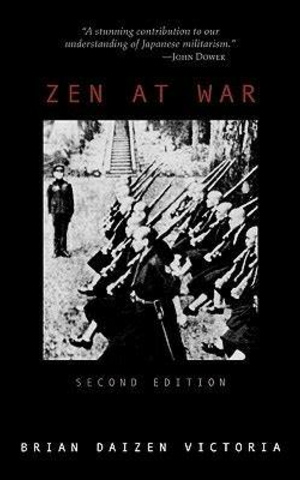
Zen at War
- Book
- 1998
- #Religion #Easternphilosophy
A compelling history of the contradictory, often militaristic, role of Zen Buddhism, this book meticulously documents the close and previously unknown support of a supposedly peacef...
Show More
ISBN: 0742539261
ISBN-13: 9780742539266
Mentions
See All
Jason Scott Montoya @JasonSMontoya
·
Jul 18, 2023
- Post
"...In order to establish eternal peace in East Asia, arousing the great benevolence and compassion of Buddhism, we are sometimes accepting and sometimes forceful. We now have no choice but to exercise the benevolent forcefullness of "killing one in order that many may live...
...it is neccessary to redirect the path of world history's advanced from this false path to the truth path.
In general, it can be said that Chinese Buddhists believe that war should absolutely be avoided no matter what the reason. Japanese Buddhists, on the other hand, believe that war conducted for a [good] reason is in accord with the great benevolence and compassion of Buddhism."
Jason Scott Montoya @JasonSMontoya
·
Aug 7, 2023
- Post
“Although the authors did not make the previous statement, it was clearly implied in the last section of their book. The last paragraph of this section (and the book) expresses the essence of their message:
‘Were the level of wisdom of the world's peoples to increase, the causes of war would disappear and wars cease. However, in an age when the situation is such that it is impossible for humanity to stop wars, there is no choice but to wage compassionate wars which give life to both oneself and one's enemy. Through a compassionate war, the warring nations are able to improve themselves, and war is able to exterminate itself.’”
Jason Scott Montoya @JasonSMontoya
·
Aug 8, 2023
- Post
“According to Hakugen, this doctrine prevented the development of the Western principle of Natural Law within Buddhism, leaving the modern concepts of human rights and justice without a foundation. In the Seventeen Article Constitution, there is an admonition to "turn one's back on self-interest and embrace the public good? Hakugen believed there existed a direct connection between this and the wartime slogan "exterminate the self and serve the public" (messhi hoko). The "public" referred to, he maintained, was none other than the state and the emperor. Thus, "The teaching of 'no-self’ became both a theory and ethic serving mikado imperialism.”
Jason Scott Montoya @JasonSMontoya
·
Aug 8, 2023
- Post
“The lack of Buddhist dogma was the fifth characteristic Hakugen identified. Lacking a transcendent, personal God who had to be worshiped and defended, Buddhism failed to establish the type of compelling basic dogma a believer would fight to preserve. In Japan, this resulted in the neglect of both discursive thought and logical theory. Instead, Buddhism concentrated on the inner self, giving the central role to the individual's subjective feelings. There was little concern for the results of external actions.”
Jason Scott Montoya @JasonSMontoya
·
Aug 8, 2023
- Post
“The eleventh characteristic involved Buddhism's emphasis on inner peace rather than justice. Lacking a God as the author of transcendental principles, Buddhism was not compelled to build a Kingdom of God based on justice here on earth. Furthermore, because Buddhism is a religion based on the idea of the emptiness of things, it had almost no basis for maintaining an antagonistic attitude towards State Shinto. Buddhism's focus on the inner peace of the individual also contributed to its failure to encourage and justify the will to reorganize society.”